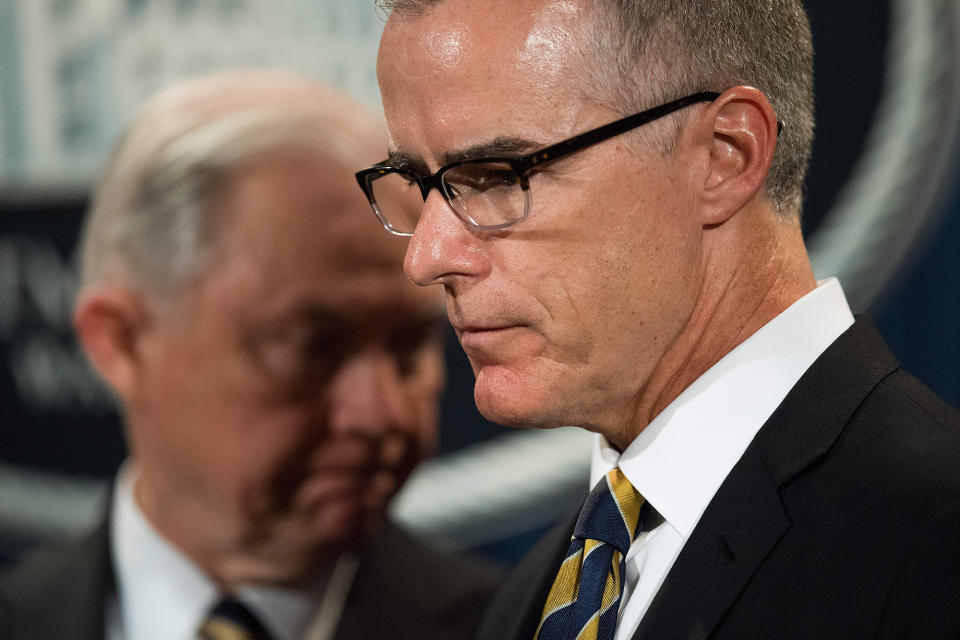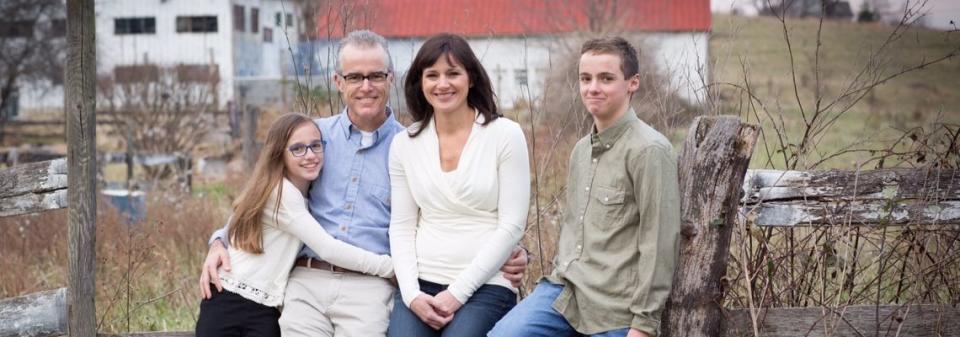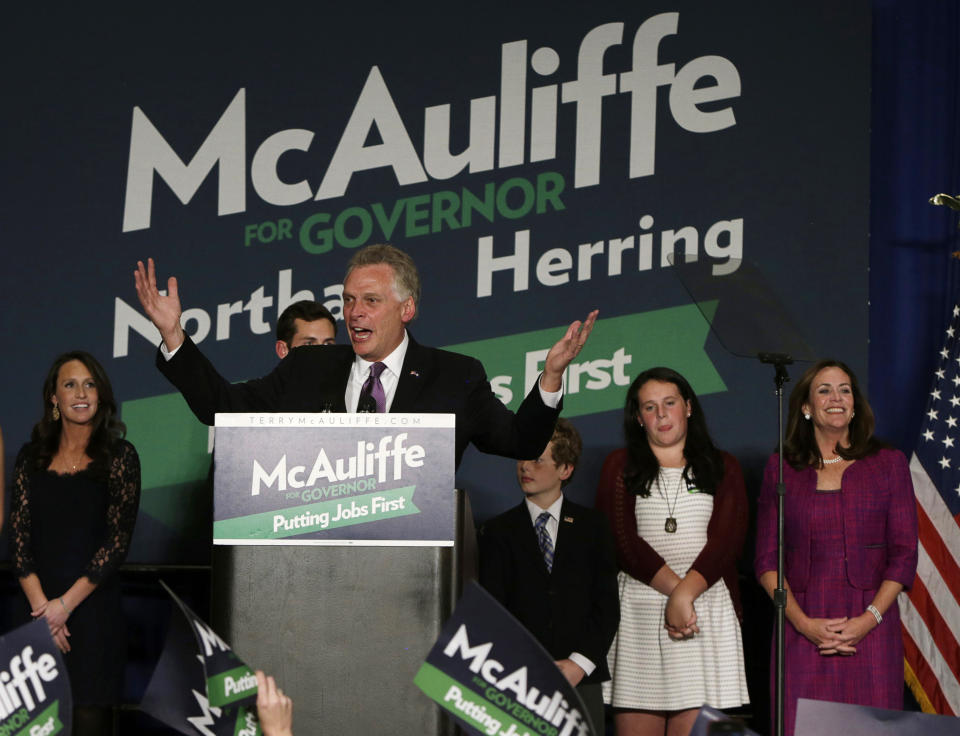What's behind Trump's charges about Andrew McCabe's wife?

President Trump’s efforts to undermine the credibility of independent law enforcement agencies inside the federal government have focused heavily on Andrew McCabe, the former acting FBI director who was fired by Attorney General Jeff Sessions last Friday.
Trump has publicly criticized McCabe numerous times for supposed bias because his wife was a Democratic candidate for the state senate in Virginia who received campaign contributions from a close ally of Hillary Clinton.
Trump wrote last year on Twitter, incorrectly, that McCabe “got $700,000 from [Hillary] for wife.” He has repeated that claim numerous times, but he also acknowledged that the money for Jill McCabe’s campaign in 2015 actually came from Terry McAuliffe, then the Democratic governor of Virginia.
And just this past weekend, the president ranted on Twitter that “McCabe was caught, called out and fired,” seeming to intimate that he was fired because of the donations that Jill McCabe’s campaign received from McAuliffe.

“How many hundreds of thousands of dollars was given to wife’s campaign by Crooked H friend, Terry M, who was also under investigation?” Trump wrote.
But there’s no evidence that McCabe’s firing had anything to do with his wife’s political career. Sessions himself said the issue was McCabe’s misleading answers when questioned about his role in authorizing FBI officials to speak to the media about an investigation. The investigation involved the Clinton family’s charitable foundation, not Trump.
The details are in an FBI report by the agency’s investigator general that has not yet been released.
But the question of why McCabe’s wife received such a large amount of money for her state senate campaign from McAuliffe, a close ally of the Clintons and a longtime fundraiser for them, has gotten overlooked.
Were the contributions a case of a Clinton ally buying influence with a high-ranking FBI official through a political donation to his wife? Or was there a political backstory in Virginia that explains the McAuliffe donation to Jill McCabe’s campaign?
Trump has clearly reached his own conclusions. He asked McCabe about the donations and called the FBI official’s wife a “loser” in a phone conversation, according to news reports. And Trump’s public calls for McCabe to be fired are seen by many as part of a broader effort on the president’s part to discredit the investigation by special counsel Robert Mueller into the Trump campaign’s actions during the 2016 election. Mueller himself was FBI director from 2001 to 2013.
“This attack on my credibility is one part of a larger effort not just to slander me personally, but to taint the FBI, law enforcement, and intelligence professionals more generally. It is part of this Administration’s ongoing war on the FBI and the efforts of the Special Counsel investigation,” McCabe said after he was fired.
A key fact is that Jill McCabe’s campaign ended before her husband ever had any oversight of the FBI probe into Hillary Clinton’s handling of classified emails. In February 2016, McCabe was promoted to the No. 2 position at the FBI under then director James Comey, and joined the executive leadership team overseeing the probe into the Clinton emails.

Jill McCabe’s race, and McAuliffe’s donations, were in 2015. McCabe, a hospital administrator in northern Virginia with no previous political experience, lost the election for the 13th District, which is in the suburbs outside Washington, D.C., to Republican Richard Black, by five points, 52 percent to 47 percent.
The first news reports about the donations did not emerge until late 2016, just before the election. At that point, McCabe recused himself from the FBI investigation into Clinton’s emails. That decision has raised questions about why he didn’t do so from the outset.
The broader context for the contributions goes back to 2014. McAuliffe had been elected governor in the fall of 2013, and was a few months into his term. Virginia governors are limited by the state constitution to one four-year term. McAuliffe’s top priority was to pass an expansion of Medicaid through the state legislature.
The Democratic governor faced an uphill battle in the House of Delegates, where Republicans held a huge majority. But the state senate was split between Democrats and Republicans, 20 to 20, giving Democrats control of the chamber, which is presided over by the lieutenant governor.
McAuliffe was going to push a Medicaid expansion through the Senate, though the House remained an obstacle. Then, in June of 2014, a Democratic state senator from southwest Virginia named Phil Puckett retired, handing control of the state Senate to Republicans. It emerged that Republicans had offered Puckett a government job. Federal prosecutors began an investigation but filed no charges. It was later reported that Democrats too had countered Republican job offers to Puckett with conversations about finding him employment if he stayed.
In the aftermath, McAuliffe resolved to win control of the state senate for Democrats in 2015. He had four seats to focus on. One was another Democratic retirement, from the 28th District near Fredericksburg, that Democrats needed to hold on to. The three others were seats that McAuliffe wanted to flip, including the 13th District, where McCabe ran, in hopes that the suburban area was turning from reliably Republican to potentially Democratic territory. Mitt Romney beat Barack Obama in the district, 51 percent to 48 percent, in the 2012 election. Republican Ed Gillespie defeated Sen. Mark Warner in 2014 in that district by 9 points.
Democrats were right about the trend. Hillary Clinton won the 13th District over Donald Trump by a large margin, 50 percent to 44 percent. But in 2015, that switch hadn’t fully happened yet.
“It was probably about two years too early,” said Dan Scandling, a Republican operative with decades of experience in Virginia politics. Scandling was a top aide to Rep. Frank Wolf, a Republican congressman who represented the 10th Congressional District from 1981 to 2015.

But McAuliffe’s political action committee, Common Good VA, gave Jill McCabe’s campaign $467,500 in campaign contributions in 2015. The state party, also an arm of McAuliffe’s political operation, chipped in about $207,000 worth of mailers. In total, her campaign received the third most of any state senate campaign from McAuliffe-controlled sources, behind two other candidates who were also part of the effort to take control of the senate. Common Good gave its biggest contribution to the state Democratic Party.
Scandling said the contributions from McAuliffe’s political arms was standard operating procedure for a governor trying to win back a chamber in the state legislature.
“It was nothing out of the ordinary, and it had nothing to do with McCabe himself. It was all about trying to capture the state senate,” Scandling said.
Democrats held their seat in the 28th District but couldn’t flip any of the seats that had been held by Republicans, including in Jill McCabe’s race. Republicans kept control of the Senate, 21 to 19.
Read more from Yahoo News:


